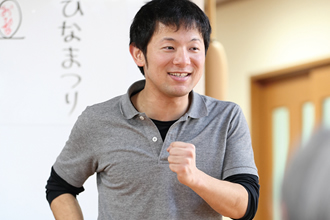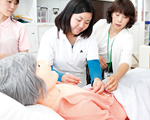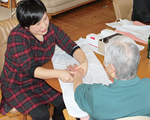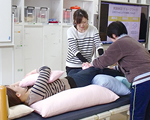Department of Living and Welfare
Developing skills as professionals in the field of caregiving and preventive care enabling students to provide assistance to people and the community

What you will study in the Department of Living and Welfare
This department fosters professionals in the field of caregiving and enables students to obtain not only the national license for certified care worker but also preventive care workers and other certifications useful at caregiving sites. The department boasts 100% employment placement to the desired worksite of each student.
Four Points of Study
-
1
- Enables acquisition of welfare-related certifications that are useful at nursing care facilities
 Students are able to receive a certified care worker license (fulfilling requirement to take the national exam) as well as preventive care worker license though study of knowledge and skills for preventive care. The need for preventive care for the elderly is expected to increase.
Students are able to receive a certified care worker license (fulfilling requirement to take the national exam) as well as preventive care worker license though study of knowledge and skills for preventive care. The need for preventive care for the elderly is expected to increase.
-
2
- Foster practical care skills through interactions with local residents
 “Ikigaizukuri-kyoshitsu (Class to find motivation for life)” includes student-planned events for challenged individuals and recreation for the elderly. Interaction with local residents allows students to acquire care skills useful at worksites.
“Ikigaizukuri-kyoshitsu (Class to find motivation for life)” includes student-planned events for challenged individuals and recreation for the elderly. Interaction with local residents allows students to acquire care skills useful at worksites.
-
3
- Full support for current and graduate students
 Current students may participate in post-graduate programs so that they can interact with and hear stories from graduate students about their work. The department also offers courses such as the Preparatory Class for National Care Manager Examination and Introductory Reflexology to help individuals who have completed the 2-year program to advance in their fields.
Current students may participate in post-graduate programs so that they can interact with and hear stories from graduate students about their work. The department also offers courses such as the Preparatory Class for National Care Manager Examination and Introductory Reflexology to help individuals who have completed the 2-year program to advance in their fields.
-
4
- Foster capability to fit into diverse care facilities
- Practical training is planned at many different nursing care homes and facilities so that students acquire the capability to smoothly fit into various living conditions of elderly individuals requiring long-term care. Supervision through cooperation between supervisor of the facility and college faculty enables students to develop practical care giving skills.
Skills acquired in the 2-year program
-
- A rich sense of humanity and the ability to establish emotional bonds
- Students acquire a rich sense of humanity and the communication skills required to build trusting relationships with care users.
-
- Professional knowledge and skills required for caregiving
- Students acquire professional knowledge and skills required of specialists in nursing care and the ability to apply them according to the type of care service.
-
- Skill to think from the perspective of others
- Students acquire skills to accurately understand the living status of users and provide support best suited to maintaining the comfortable lifestyle of care users.








